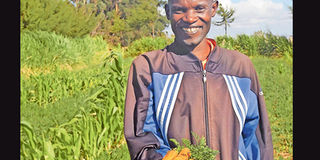Taekwondo ace knocks healthy returns out of carrots

Michael Kimathi in his farm in Meru. He grows the Royal Chantenay carrot variety, which is known for its sweet flavour, shape and dark orange colour. PHOTO | CAROLINE WAMBUI | NMG
What you need to know:
- Carrots require a lot of water to enhance good root development.
- Kimathi explains that soil is a key determinant of good carrot growth, and apart from being fine, it should also be well-drained and fertile.
- During planting, Kimathi uses a kilo of seeds for his one acre and uses a spacing of 12-15cm between plants. His farming is purely organic.
- Carrots are excellent sources of vitamin A, C, calcium and iron.
Off the Meru-Nanyuki highway, on the dusty Kilimambogo Road, sits Michael Kimathi’s carrot farm. The Seeds of Gold team finds the farmer, 36, and his daughter Sarah Kendi, 11, on the farm watering the crop.
“Carrots require a lot of water to enhance good root development,” says the farmer after some pleasantries.
He adds that poor watering leads to shallow root development, which affects quality as it makes the produce susceptible to hot weather.
Kimathi grows the Royal Chantenay variety, which is known for its sweet flavour, shape and dark orange colour. It also guarantees the farmer up to 100 per cent germination. He started farming carrots two years ago after switching from potatoes due to poor prices.
“I have found carrot farming stress-free and it has better returns compared to potatoes. The crop has a short maturity period and high returns with a 90kg sack going at an average of Sh3,000,” says Kimathi, who invested Sh20,000 when starting.
The money went to seeds, ploughing the land using a tractor, levelling and planting.
“Normally during planting, I hire six workers who collect all the small rocks from the farm since carrots grow well in fine soils,” Kimani, who together with his daughter are taekwondo champs, says.
Sarah has represented Kenya in the junior tournament in South Korea and holds a black belt while his father is a taekwondo trainer.
ACT AS WINDBREAKERS
Kimathi explains that soil is a key determinant of good carrot growth, and apart from being fine, it should also be well-drained and fertile. “The soil should also have sufficient potassium, an important mineral in farming carrots since it enhances the sweetness and makes it solid.”
During planting, Kimathi uses a kilo of seeds for his one acre and uses a spacing of 12-15cm between plants. His farming is purely organic.
He grows napier grass and maize on the edges of the farm to act as windbreakers after which they are used in silage making.
Carrots take four months to mature, with the farmer noting he plants them based on demand trends as he analyses the market before farming.
“I normally have three seasons, between December to March, April to July and August to November.” Harvesting begins when the roots are big, soft and juicy. It is either done manually by pulling the crop from the soil by hand or by use of a spade.
Late harvesting may result in poor quality produce as the carrots may crack, he says. After harvesting the seven tonnes of the produce, he feeds the green fibrous part and produce considered rejects to his two three Friesian cows.
Powdery mildew, black root rot and bacteria wilt are some of the diseases that affect carrots. The first two can be treated by curative fungicides, says John Kiogora, an agronomist from Elgon Kenya.
****
Nutrients
Carrots are excellent sources of vitamin A, C, calcium and iron.
They are also a rich source of beta carotene, a powerful antioxidant that helps maintain a healthy skin and good eyesight.
Carrots also help in killing harmful germs in the mouth, thus preventing tooth decay.
Carrots can be consumed in various ways that include steaming, eat raw, cooking or making carrot juice.





